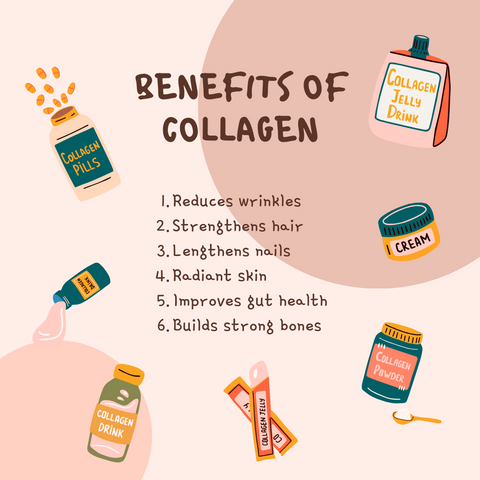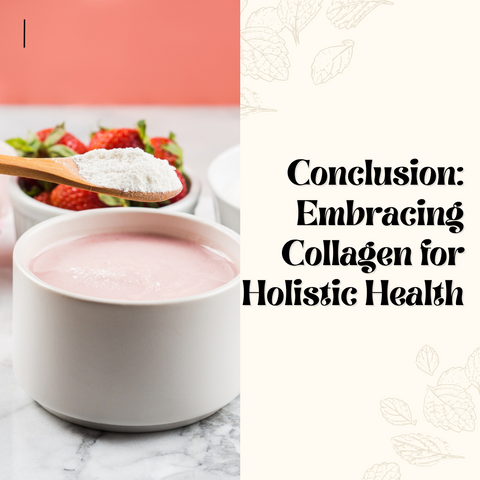Drinkable collagen has grown in popularity as a supplement with numerous claims of skin health and overall well-being advantages. It is crucial to note, however, that scientific research on some of these advantages is still in its early stages, and individual reactions to collagen supplementation may vary. This blog provides an outline of the potential benefits of drinking collagen.
Understanding Drinkable Collagen and Its Benefits

Drinkable collagen, which is often marketed as collagen supplements in the form of powders, liquid drinks, or shots, has gained popularity in the health and beauty industry. Collagen is a protein that is essential for the structure of the body's skin, hair, nails, joints, and other connective tissues. While scientific research on drinkable collagen is ongoing, several claimed benefits of its consumption include improved skin health, joint health, pain relief, hair and nail strength, gut health, muscle mass and recovery, bone health, and anti-aging effects. It is noteworthy that although there exists some scientific backing for these possible advantages, the reactions of individuals to collagen supplementation may differ. Furthermore, variables including the kind of collagen utilised, where it comes from, and how it is made can affect the efficacy and quality of collagen supplements.
What is Drinkable Collagen?
Drinkable collagen is a type of collagen supplement that is designed to be eaten in liquid form. These supplements are intended for oral consumption, making it simple to incorporate collagen into one's diet. The most prevalent protein in the human body, collagen, is essential for the formation of the skin, hair, nails, joints, and connective tissues.
The Science Behind Collagen Supplements
Collagen supplements, which are frequently marketed as improving skin health, joint function, and other benefits, have become increasingly popular in recent years. The science behind collagen supplements is summarised below:
-
Composition of Collagen: Collagen is the most prevalent protein in the human body, supporting tissues such as skin, bones, tendons, ligaments, and cartilage with structural support. Collagen is a complex protein composed primarily of amino acids such as glycine, proline, hydroxyproline, and arginine.
-
Hydrolyzed Collagen: Hydrolyzed collagen, also known as collagen peptides or collagen hydrolysate, is included in the majority of collagen supplements. Hydrolysis breaks down collagen into smaller peptides, which the body can absorb more easily.
-
Bioavailability: Collagen peptides are easily absorbed by the body when eaten. Collagen peptides are absorbed and circulated in the bloodstream, where they are distributed to a variety of tissues.
-
Skin Health: Collagen supplements are frequently marketed for increasing skin suppleness and wrinkle reduction. Some research suggests that collagen supplementation may improve skin hydration, suppleness, and reduce obvious indications of ageing. Collagen peptides may increase collagen formation in the skin.
-
Joint Health: By increasing cartilage synthesis, collagen supplements may help joint health. According to a study, collagen supplementation may help reduce joint pain in persons with osteoarthritis. Collagen peptides may aid in the maintenance and healing of joint tissue.
-
Muscle Mass and Strength: Collagen contains amino acids that are essential for muscular function. Some research suggests that collagen supplementation, especially when combined with resistance training, may help to enhance muscular growth and strength. Collagen amino acids aid in the production of muscle protein.
-
Hair and Nails: Collagen supplements may increase hair and nail strength and quality. Collagen supplements may strengthen and improve the quality of your hair and nails. Collagen supplementation may improve hair and nail health by reducing brittleness and increasing growth, according to preliminary study.
-
Gut Health: Collagen may benefit gut health by keeping the gut lining intact. Collagen peptides may aid with disorders like leaky gut syndrome by maintaining the mucosal lining of the gastrointestinal tract, according to some research.
-
Bone Health: Collagen supplements may improve bone health by increasing bone mineral density. Collagen supplementation may benefit bone health, particularly in postmenopausal women, according to research.
While there is some scientific backing for these possible advantages, the effectiveness of collagen supplements can differ between individuals. Furthermore, further research is required to completely understand the mechanisms and ideal dosages for various health consequences. It is best to consult with a healthcare practitioner before introducing collagen supplements into your routine, especially if you have certain health issues or illnesses. Individual reactions to collagen supplementation may vary, and lifestyle factors may play a role in general health and well-being.
Key Benefits for Skin, Hair, and Nails
Collagen supplements are often marketed for their potential benefits for skin, hair, and nails. While individual responses may vary, here are the key potential benefits associated with collagen supplementation in these areas:
Skin:
-
Improved Skin Elasticity: Collagen is a structural protein that gives the skin strength and flexibility. Collagen supplements may help enhance skin suppleness and reduce the appearance of sagging or fine wrinkles.
-
Reduced Wrinkles and Fine Lines: Collagen peptides may increase collagen formation in the skin. Collagen supplementation may help reduce the visibility of wrinkles and fine lines, providing a smoother complexion, according to certain research.
-
Increased Skin Hydration: Collagen aids in the retention of moisture by the skin. Collagen supplements may aid in skin hydration, resulting in a more supple and moisturised complexion.
-
Promotion of Wound Healing: Collagen is important in the healing of wounds. Collagen supplementation may help wounds and skin damage heal faster.
Hair:
-
Improved Hair Strength: Collagen includes amino acids that are essential for hair structure. Collagen supplements may help to strengthen hair and reduce brittleness and breakage.
-
Promotion of Hair Growth: Collagen helps hair follicles. Collagen supplementation may enhance hair development and prevent hair loss, according to some studies.
Nails:
-
Stronger Nails: Collagen gives nails structural stability. Collagen supplements may assist strengthen and resiliency of nails, reducing brittleness.
-
Promotion of Nail Growth: Collagen promotes the health of the nail beds. Collagen supplementation may help to accelerate nail development.
While there is some scientific backing for these possible advantages, the effectiveness of collagen supplements can differ between individuals. Lifestyle factors, overall health, and supplement quality can all have an impact on outcomes. Consider checking with a healthcare practitioner before introducing collagen supplements into your routine, especially if you have specific health issues or diseases.
How Drinkable Collagen Works in the Body

Drinkable collagen, which is frequently in the form of collagen peptides or hydrolyzed collagen, is intended to be consumed and acts in the body through several processes involving digestion, absorption, and utilisation of its constituent amino acids. Here's a rundown of how drinking collagen functions in the body:
-
Ingestion: Collagen supplements are frequently used as beverages, powders, or injections. These supplements usually contain hydrolyzed collagen, which implies it has been broken down from larger collagen molecules into smaller peptides.
-
Digestion: Collagen enters the digestive system after being ingested. Stomach acid and digestive enzymes break down collagen further into smaller peptides and individual amino acids.
-
Absorption: Small peptides and amino acids are absorbed into the bloodstream via the gut lining. Collagen peptides have higher bioavailability than intact collagen molecules because they are smaller and more easily absorbed by the body.
-
Distribution: The bloodstream transports collagen peptides to various tissues and organs throughout the body. These peptides are supplied to the body's collagen-requiring tissues, such as the skin, joints, bones, hair, and nails.
-
Stimulation of Collagen Synthesis: Collagen peptides, once in the target tissues, may stimulate the cells responsible for collagen synthesis. Fibroblasts, for example, are skin cells that make collagen. Collagen peptides may signal these cells to produce more collagen.
-
Skin Health: Collagen is an important structural component of the skin. Increased collagen production may lead to enhanced skin suppleness, hydration, and wrinkle reduction.
-
Joint Support: Collagen is required for the structure of cartilage in the joints. Collagen peptides may help in cartilage formation and maintenance, potentially improving joint health.
-
Hair and Nail Health: Collagen is a protein that is found in hair and nails. Supplementing with collagen may provide the necessary building blocks for stronger, healthier hair and nails.
-
Overall Health: Collagen can be found in a variety of tissues such as bones, tendons, ligaments, and muscles. Supplementing with collagen may help to maintain the health and integrity of these tissues.
While collagen supplementation has been linked to a range of health advantages, individual reactions can differ. The effectiveness of drinkable collagen may be influenced by factors such as supplement quality, dosage, and individual health issues. Furthermore, continuous research is being conducted to investigate the mechanisms and best utilisation of collagen supplementation for diverse health outcomes. If you are considering drinking collagen, consult with your doctor first, especially if you have any health problems or illnesses.
Absorption and Bioavailability
The absorption and bioavailability of drinkable collagen are critical factors in determining its effectiveness in providing the intended health benefits. The following is an overview of how absorption and bioavailability affect collagen utilisation in the body:
-
Hydrolyzed Collagen: Hydrolyzed collagen or collagen peptides are common forms of collagen supplements. Hydrolysis converts large collagen molecules into smaller peptides, increasing bioavailability.
-
Digestion and Absorption: When collagen is consumed, it is exposed to stomach acid and digestive enzymes during the digestive process. The hydrolyzed collagen is broken down into smaller peptides and individual amino acids, which are then absorbed into the bloodstream via the intestinal lining.
-
Bioavailability: The proportion of a substance that enters the bloodstream when introduced into the body and is made available for use or storage is referred to as bioavailability. Hydrolyzed collagen has a high bioavailability, which means it is easily absorbed and used by the body.
-
Amino Acid Composition: Collagen is high in amino acids such as glycine, proline, hydroxyproline, and arginine. These amino acids are necessary for collagen synthesis and contribute to the health of many tissues, including the skin, joints, and bones.
-
Tissue Distribution: Collagen peptides are distributed to various tissues and organs throughout the body after being absorbed into the bloodstream. The body prioritises the utilisation of these amino acids based on its needs, directing them to areas where collagen is required, such as the skin, joints, and other connective tissues.
-
Collagen Peptide Stimulation of Collagen Synthesis: Collagen peptides may stimulate collagen synthesis in cells such as fibroblasts in the skin and chondrocytes in the joints. This stimulation promotes the body's natural collagen production in the target tissues.
-
Skin, Hair, and Nail Benefits: Increased collagen synthesis in the skin may help with elasticity, hydration, and wrinkle reduction. Collagen may provide the necessary building blocks for strength and growth in hair and nails.
-
Support for the Joints: Collagen peptides have the potential to improve joint health by promoting the synthesis and upkeep of cartilage in the joints and by possibly easing the symptoms of diseases like osteoarthritis.
-
General Health: Collagen is found in a variety of tissues, such as muscles, tendons, ligaments, and bones, and it helps to maintain the integrity and general health of these anatomical structures.
It is vital to remember that everyone reacts differently to collagen supplements, and that the quality, dosage, and specific health conditions of each supplement may all affect how effective it is. The mechanisms and best use of collagen supplementation for various health outcomes are being investigated, even though some studies point to positive effects. For individualised guidance, speak with a healthcare provider if you are thinking about drinking collagen.
Collagen's Role in Skin Elasticity and Joint Health
Collagen is necessary for joint health and skin elasticity because it provides structural integrity and support to these tissues. Let us look at the roles that collagen plays in these bodily functions:
-
Structured proteins, collagen types, fibroblasts, collagen synthesis, skin elasticity, ageing, collagen depletion, and collagen supplementation are all components of collagen and skin elasticity.
-
Cartilage composition, joint structure, chondrocytes and collagen synthesis, osteoarthritis, and collagen loss, collagen supplementation and joint support, and exercise and collagen production are all aspects of collagen and joint health.
Collagen is essential for skin elasticity and joint function. Collagen supplementation, when combined with a healthy lifestyle, may improve both the skin and the joints, particularly as the body's natural collagen production slows with age. Individual responses to collagen supplements can vary, so it's vital to seek personalised guidance from a healthcare practitioner, especially if you have specific health issues.
Comparing Different Types of Collagen Supplements
Collagen supplements are available in a variety of forms, each derived from a different source and containing distinct collagen types. Here's a rundown of the most common collagen supplement types:
-
Type I Collagen: Derived from either bovine (cow) or marine (fish) collagen. keeps skin hydrated and elastic. Contributes to the health of the hair and nails. It stimulates overall collagen synthesis. Those with beef allergies or dietary restrictions should avoid consuming bovine collagen. Pescatarians and those who avoid land animal products can benefit from marine collagen.
-
Type II Collagen: The primary source is chicken collagen. Helps to maintain joint health and cartilage. Individuals suffering from osteoarthritis may benefit from this treatment. Frequently used for focused joint support. Chicken collagen is a common source, but it may not be appropriate for those who avoid poultry products.
-
Type III Collagen: The collagen is typically derived from bovine or porcine (pig) collagen. Helps to maintain skin elasticity. It contributes to the structure of organs and blood vessels. It can be combined with Type I collagen to provide comprehensive skin benefits. Certain dietary restrictions may preclude the use of bovine or porcine sources.
-
Type V Collagen: It is frequently found alongside Type I collagen derived from bovine or marine sources. It aids in the formation of cell surfaces. During pregnancy, it helps to keep hair follicles and the placenta healthy. For broader benefits, it is frequently included in multi-collagen supplements.
-
Type X Collagen: Chicken collagen was used to make this product. It is necessary for the formation of articular cartilage. Helps with skeletal development. Typically found in formulations aimed at joint health.
-
Multi-Collagen Blends: A blend of various collagen types derived from various sources. Provides a broader range of collagen types for more comprehensive benefits. It is similar to the variety of collagens found in the body. For those looking for diverse collagen support, this is a convenient option. Check the source and quality of each collagen type in the blend.
It is best to consult with a healthcare professional before selecting a collagen supplement, especially if you have specific health concerns or dietary restrictions. Individual responses to collagen supplements may vary, and personalized advice can help determine the most suitable option for your needs.
Incorporating Collagen into Your Wellness Routine

Collagen can be incorporated into your wellness regimen in a variety of ways, depending on your preferences, lifestyle, and individual health goals. Collagen supplements, drinkable collagen, food and snacks, smoothies and shakes, incorporate collagen-rich foods, collagen-boosting recipes, topical collagen products, pair collagen with vitamin C, consistency is key, and combine collagen with healthy lifestyle habits are some suggestions for incorporating collagen into your daily routine. Individual responses to collagen supplementation can vary, so it's important to listen to your body. If you have specific health issues or are hesitant about introducing collagen into your regimen, seek personalised guidance from a healthcare practitioner. Whether you add collagen to your morning coffee, blend it into a smoothie, or eat it as a delectable snack, choosing a way that fits effortlessly into your everyday life will make it simpler to include collagen into your wellness regimen.
Recommended Dosages and Best Practices
The suggested dosage of collagen supplements varies depending on the type of collagen, your health goals, and personal demands. Furthermore, different items may have varying serving sizes and concentrations. Here are some general collagen supplementation guidelines and best practices:
-
Collagen Type: Different forms of collagen may have distinct advantages. Type I collagen is frequently advised for skin health, and Type II collagen is related with joint support.
-
Dosage: Dosages for collagen supplements vary, but a typical daily dose is 5 to 15 grammes. The effectiveness of collagen may vary depending on its form (powder, capsules, or liquid) and concentration.
-
Bioavailability: For increased bioavailability, use hydrolyzed collagen or collagen peptides. These forms are broken down into smaller particles that the body can absorb more easily.
-
Combination Formulas: Some supplements contain a blend of collagen types as well as additional components such as vitamins and minerals. Follow the dosing instructions on the product packaging.
-
Specific Health Goals: A daily dose of Type I collagen may be beneficial for skin. Type II collagen supplementation may be beneficial to joint health. Multi-collagen blends offer a broader range of collagen types.
-
Consider Other Nutrients: Vitamin C is required for collagen synthesis. Combine collagen consumption with vitamin C-rich foods or supplements.
-
Timing: Collagen supplements are safe to take at any time of day. Some people prefer to take it in the morning, while others prefer to take it before bed or with meals. Consistency is essential. Choose a time that works well with your schedule and stick to it.
-
Mixing Collagen: Collagen powder can be added to a variety of beverages and foods. It is frequently dissolved in hot or cold beverages such as coffee, tea, smoothies, or water.
-
Hydration: Drink sufficient water when taking collagen supplements, especially if using powdered forms. Staying hydrated supports overall health and can enhance the benefits of collagen.
-
Quality Matters: Choose reputable brands of high-quality collagen supplements. Consider the collagen source (bovine, marine, or chicken) and look for products with few additives.
-
Consultation with a Professional: Consult a healthcare professional before beginning collagen supplementation if you have any existing health conditions or concerns, or if you are pregnant or breastfeeding.
-
Patience and Consistency: Collagen benefits may take some time to become apparent. For several weeks to months, be patient and consistent with your intake.
Combining Collagen with Other Nutrients
Combining collagen with other nutrients can increase its effectiveness and benefit overall health. Vitamin C, Zinc, Copper, Protein, Vitamin E, Hyaluronic Acid, Silica, Vitamin A, Antioxidants, Omega-3 Fatty Acids, and Amino Acids (Glycine, Proline, Hydroxyproline) are some key nutrients and compounds that work synergistically with collagen.
Important Considerations:
-
Dietary Variety: Eating a well-balanced diet rich in nutrient-rich foods ensures that you get a wide range of vitamins and minerals to support overall health, including collagen synthesis.
-
Supplementation: If you are thinking about taking supplements, consult with a healthcare professional to make sure you are meeting your specific nutritional needs.
-
Consistency: Incorporating a diverse range of nutrients into your diet regularly promotes overall wellness and can supplement the benefits of collagen supplementation.
Individual nutritional needs vary, so it is best to seek personalised advice from a healthcare professional or a registered dietitian based on your health goals and circumstances.
Vegan and Natural Collagen Alternatives
Collagen is largely present in animal tissues, and conventional collagen supplements are frequently derived from bovine (cows), marine (fish), or chicken sources. If you live a vegan or vegetarian lifestyle or prefer natural alternatives, various plant-based and natural alternatives can stimulate collagen formation or give similar advantages. Keep in mind that plant-based foods rich in amino acids, soy products, seeds, leafy green vegetables, berries, citrus fruits, nuts, vitamin C-rich foods, plant-based collagen supplements, aloe vera, and silica-rich foods may not directly replace collagen but can contribute to overall skin health, joint support, and collagen synthesis. While vegan and natural alternatives do not directly provide collagen, they can improve overall skin health, support collagen synthesis, and provide a variety of other health benefits.
Conclusion: Embracing Collagen for Holistic Health

Including collagen in your holistic health practice can provide numerous benefits for your skin, joints, and overall well-being. Collagen is a key protein that offers structural support to many tissues in the body, and adding it to your lifestyle can help your overall health in a variety of ways. Integrating collagen into your holistic health plan is a combination of food changes, lifestyle changes, and, if wanted, supplementation. The idea is to support the body's natural processes and promote general well-being, whether you pick collagen supplements, collagen-rich meals, or plant-based alternatives. Individual responses may vary, as with any health-related decision, so listen to your body and seek professional guidance if necessary. Including collagen in your holistic health journey can help you become healthier and more vibrant.
















